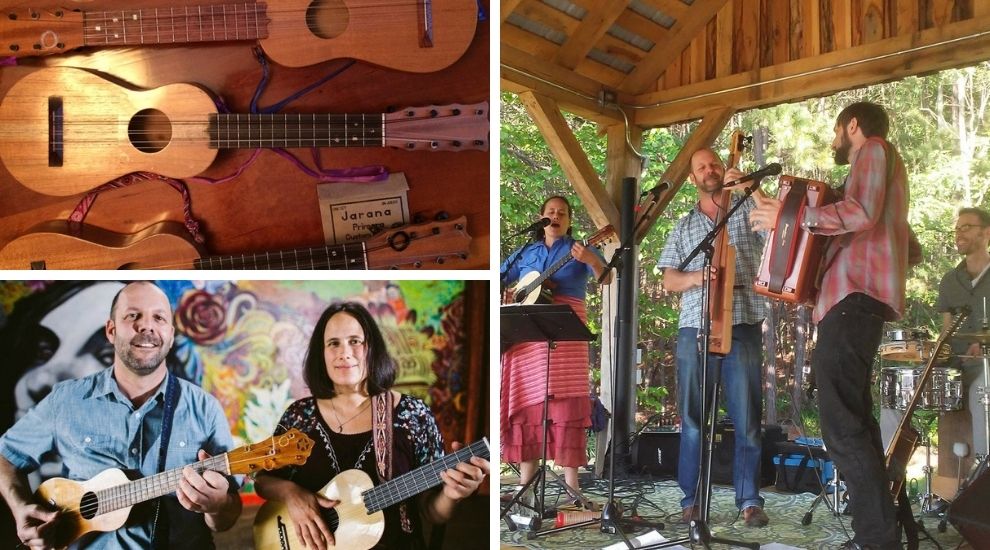#MBUfamily members are in for a special treat at 7 p.m. on Sept. 30 in James D. Francis Auditorium: The LUA Project will carry listeners on a musical journey through the sonic folk cultures of historic Mexico, Appalachia, and the Atlantic basin.
Along the way, they’ll tell stories and muse about the roots of each — taking narrative and melodic forays into Eastern Europe, Scotland, Ireland, Medieval Spain, Mexico, South America, the Blue Ridge Mountains, and elsewhere.
“We think of this band as a cultural pollinator,” said founding singer-songwriter Estela Knott. She calls the quintet’s self-described “Mexilachian” music a bridge between traditions spanning continents and centuries.

Knott formed the Charlottesville-based group with husband Dave Berzonsky (an accomplished upright bassist and global folk music aficionado) after noting similarities between traditional bluegrass ballads and Mexican son jarocho — an afro-mestizo musical form that developed in 18th century southern Mexico. Both genres center around acoustic string instruments like the violin, repetitive melodies, driving rhythms, and lyrics that tell the stories of working class people. The couple began to research the history of the two forms. Commonalities inspired them to partner with eight-string jarana master and lyricist Zenen Zeferino to create a show that would explore and fuse the styles.
“When you [trace the musical genealogy] of the Appalachian ballad and son jarocho forms, you find they’re both rooted in Medieval Europe,” said Dr. Brenci Patiño, department head of Latin American and Francophone studies at Mary Baldwin. While they developed in different geographic areas, both “share common cultural ideas [about composition, melody, and lyricism].”
Colonialism and migration carried the forms to North America. New ideas were introduced over time, and the music evolved. For instance, one player of Scotch-Irish fiddle tunes might adapt the percussive pulse of West African banjar music; a successor may add Jewish melodies from Eastern Europe. More recently, Latin American immigrants brought music like son jarocho to places like the Shenandoah Valley.
Knott, Berzonsky, and Zeferino’s music explores and celebrates that intersectionality. Together they created “a repertoire that constitutes a new kind of traditional music” that emphasizes evolution through cultural fusion, said Berzonsky. The concept — and the music it’s birthed — is one “we can pass down to our children to experience, transform, and pass on again.”

The LUA Project’s music offers a window into Latine heritage while mirroring band members’ personal experience. “It reflects the way [many of us] sort-of straddle these different cultural identities and have to find ways to fuse them into something beautiful, new, and unique,” said Dr. Brenci Patiño, department head of Latin American and Francophone studies.
Patiño calls the results musically interesting and culturally valuable. They inspired her to seek grant funding from the Virginia Commision of the Arts to bring LUA Project to MBU as part of the university’s Latine Heritage Month celebration.
“For Latine children growing up in the U.S., it can be hard or even impossible to authentically connect with their cultural heritage,” said Patiño. The LUA Project’s music offers a window into that heritage while mirroring their personal experience. “It reflects the way [many of us] sort-of straddle these different cultural identities and have to find ways to fuse them into something beautiful, new, and unique.”
That message, said new Chief Diversity Officer Andrea Cornett-Scott, resonates with MBU’s core values — and lies at the heart of its annual Latine Heritage celebration.
“We want to find as many ways as possible to help students celebrate humanity in all its wondrous and complex variation,” she said, adding that cross-cultural exploration is a great way to expand and enrich young minds. The goal is to foster a local and global “community where all may flourish, recognize one another’s value, and always be treated with mutual respect and compassion.”
Interested in learning more about MBU’s Latine Heritage month celebrations? CLICK HERE.